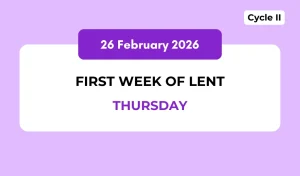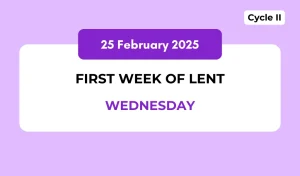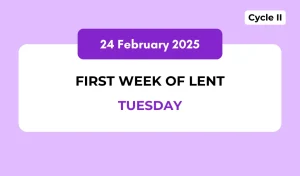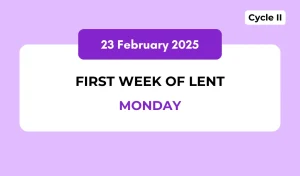Catholic Mass Readings and Reflection November 22, 2025
Saturday – 33rd Week in Ordinary Time
22nd November 2025 (Saturday)
Psalter: Week 1
Readings of the Day
First Reading: 1 Maccabees 6:1-13
In those days: King Antiochus was going through the upper provinces when he heard that Elymais in Persia was a city famed for its wealth in silver and gold. Its temple was very rich, containing golden shields, breastplates, and weapons left there by Alexander son of Philip the Macedonian king who first reigned over the Greeks. So he came and tried to take the city and plunder it, but he could not, because his plan became known to the men of the city and they withstood him in battle. So he fled and in great grief departed from there to return to Babylon. Then someone came to him in Persia and reported that the armies that had gone into the land of Judah had been routed; that Lysias had gone first with a strong force, but was turned back before the Jews; that the Jews had grown strong from the arms, supplies, and abundant spoils that they had taken from the armies they had cut down; that they had torn down the abomination that he had erected upon the altar in Jerusalem; and that they had surrounded the sanctuary with high walls as before and also Beth-zur, his city. When the king heard this news, he was astounded and badly shaken. He took to his bed and became sick from grief, because things had not turned out for him as he had planned. He lay there for many days, because deep grief continually gripped him, and he concluded that he was dying. So he called all his friends and said to them, “Sleep departs from my eyes and I am downhearted with worry. I said to myself, ‘To what distress | have come! And into what a great flood I now am plunged! For I was kind and beloved in my power.’ But now I remember the evils I did in Jerusalem. I seized all her vessels of silver and gold; and I sent to destroy the inhabitants of Judah without good reason. I know that it is because of this that these evils have come upon me; and behold, I am perishing of deep grief in a strange land.”
Psalm 9:2-3, 4 and 6, 16 and 19 (R. see 15c)
R/. I will rejoice in your salvation, O Lord.
Gospel Acclamation
V/. Alleluia
R/. Alleluia
V/. Our Saviour Christ Jesus abolished death and brought life and immortality to light through the gospel.
R/. Alleluia
Gospel: Luke 20:27-40
At that time: There came to Jesus some Sadducees, those who deny that there is a resurrection, and they asked him a question, saying, “Teacher, Moses wrote for us that if a man’s brother dies, having a wife but no children, the man must take the widow and raise up offspring for his brother. Now there were seven brothers. The first took a wife, and died without children. And the second and the third took her, and likewise all seven left no children and died. Afterwards the woman also died. In the resurrection, therefore, whose wife will the woman be? For the seven had her as wife.” And Jesus said to them, “The sons of this age marry and are given in marriage, but those who are considered worthy to attain to that age and to the resurrection from the dead neither marry nor are given in marriage, for they cannot die any more, because they are equal to angels and are sons of God, being sons of the resurrection. But that the dead are raised, even Moses showed, in the passage about the bush, where he calls the Lord the God of Abraham and the God of Isaac and the God of Jacob. Now he is not God of the dead, but of the living, for all live to him. Then some of the scribes answered, “Teacher, you have spoken well.” For they no longer dared to ask him any question.
Daily Gospel Reflection
Saturday – 33rd Week in Ordinary Time
Main Point: We are given this life so that we can live it well. This earthly life is only a temporary duration and we should never lose sight of what lies after
1. We often experience and witness a dominant culture of death. A lot of fear, violence and destruction surrounds us. Respect for life and human dignity, values and relationships is fast declining.
2. The idea of God as well as the approach to Him are shallow and defective. God is seen as a God of stop-gaps, one who is sought in times of need and use. Further, there is a heavy tendency to “privatize” God also, confining Him to the boundaries of religion or class.
3. All these are nothing but tendencies of making God dead. Perhaps this is the re-rising of the negative philosophy of Nietzsche, “God is dead”. When people do not live and promote the life that is given by God, they deaden God.
4. When God does not live within and amidst the humans, they deaden Him. When His kingdom of love, justice and peace do not reign among the humans, they make Him dead.
5. It is in this context, that the declaration of Jesus that “God is not God of the dead, but of the living; because all live to Him” makes tremendous sense. Death is not our end or destiny. Life and that too, eternal life is our end and destiny. Physical death is only a closure to the earthly life. But it is an opening upon a new life, an everlasting life.
6. This life in eternity is a life above and beyond the earthly life. This means that we are raised to a higher level where we do not operate merely on the basis of earthly ties or human attachments. We will also not be carried away by earthly pursuits or interests. We become fully spiritual and heavenly. In the words of Jesus, we “are equal to angels and are sons of God, being sons of the resurrection”.
7. Therefore, to attain that life of eternity, we need to recommit ourselves to making God live in us and among us. We must be alive to God. We must foster a culture of life that reflects God, for all life belongs to Him. God must re-enter and live more intimately in human hearts, lives, societies and nations.
8. For this, one essential condition is the realization and repentance over our sinfulness, like Antiochus in the first reading from 1 Maccabees. He reflects, realizes and repents over his wickedness against Israel and against God Himself.
My Practice: The reality of death must constantly remind us that we must look beyond death. Our faith makes us focused on eternity; our hope must make us directed to heaven; and our charity must make us committed to earth






